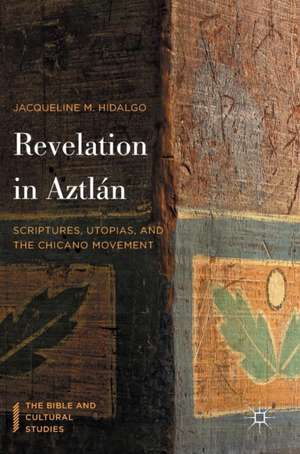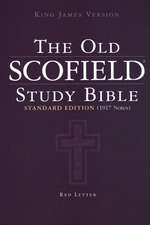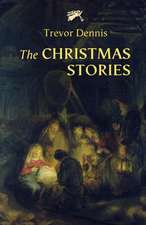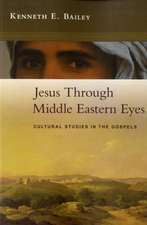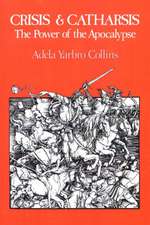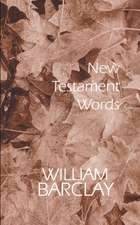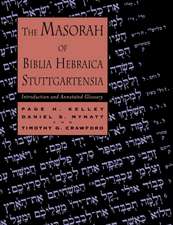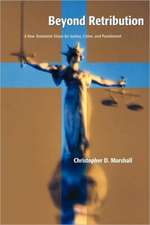Revelation in Aztlán: Scriptures, Utopias, and the Chicano Movement: The Bible and Cultural Studies
Autor Jacqueline M. Hidalgoen Limba Engleză Hardback – sep 2016
Preț: 587.85 lei
Preț vechi: 691.59 lei
-15% Nou
Puncte Express: 882
Preț estimativ în valută:
112.50€ • 116.22$ • 93.63£
112.50€ • 116.22$ • 93.63£
Carte tipărită la comandă
Livrare economică 26 martie-09 aprilie
Preluare comenzi: 021 569.72.76
Specificații
ISBN-13: 9781137592132
ISBN-10: 1137592133
Pagini: 305
Ilustrații: XI, 314 p. 3 illus. in color.
Dimensiuni: 148 x 210 x 24 mm
Greutate: 0.53 kg
Ediția:1st ed. 2016
Editura: Palgrave Macmillan US
Colecția Palgrave Macmillan
Seria The Bible and Cultural Studies
Locul publicării:New York, United States
ISBN-10: 1137592133
Pagini: 305
Ilustrații: XI, 314 p. 3 illus. in color.
Dimensiuni: 148 x 210 x 24 mm
Greutate: 0.53 kg
Ediția:1st ed. 2016
Editura: Palgrave Macmillan US
Colecția Palgrave Macmillan
Seria The Bible and Cultural Studies
Locul publicării:New York, United States
Cuprins
Introduction: Scriptures, Place, and No Place in the Chicano Movement.- Chapter One: “We Are Aztlán”: Writing Scriptures, Writing Utopia in El Plan Espiritual de Aztlán.- Chapter Two: “The Holy City Which Has Been Written in This Book”: The Utopian Scripturalization of Revelation.- Chapter Three: “The Spirit Will Speak for My People”: El Plan de Santa Barbara and the Chicanx Movement as a Project of Scripturalization.- Chapter Four: “Power and Dominance, Loyalty and Conformity”: Family, Gender, Sexuality, and Utopian Scripturalization.- Chapter Five: “Faith and Social Justice Are So Connected in My Book”: Scriptures, Scrolls, and Scribes as Technologies of Diaspora.- Coda: Scriptural Revelations and Reconquest.
Recenzii
“Hidalgo does a good job of navigating the world of religious study/commentary and Latino/a studies. It is a masterful work of Chicanx history and texts … . for experts in Chicanx studies, the analysis of key texts from the lens of scripture and utopia provides a new avenue of studying this history that pays attention to religious language.” (Fides et Historia, Vol. 51 (1), 2019)
“Revelaon in Aztlán is a must-read for anyone interested in the Chicanx movement and contemporary biblical scholarship. It is a bold and eloquent work written by a scholar for an audience of scholars. … Hidalgo’s work provides a template for understanding an oppressed community from a tumultuous era in the last century, but it also opens new opportunies to reflect on and respond to our crisis today.” (Jason Steidle, Reading Religion, readingreligion.org, September, 2018)
Notă biografică
Jacqueline M. Hidalgo is Assistant Professor of Latina/o Studies and Religion at Williams College in Massachusetts, USA.
Textul de pe ultima copertă
Bridging the fields of Religion and Latina/o Studies, this book fills a gap by examining the “spiritual” rhetoric and practices of the Chicano movement. Bringing new theoretical life to biblical studies and Chicana/o writings from the 1960s, such as El Plan Espiritual de Aztlán and El Plan de Santa Barbara, Jacqueline M. Hidalgo boldly makes the case that peoples, for whom historical memories of displacement loom large, engage scriptures in order to make and contest homes. Movement literature drew upon and defied the scriptural legacies of Revelation, a Christian scriptural text that also carries a displaced homing dream. Through the slipperiness of utopian imaginations, these texts become places of belonging for those whose belonging has otherwise been questioned. Hidalgo’s elegant comparative study articulates as never before how Aztlán and the new Jerusalem’s imaginative power rest in their ambiguities, their ambivalence, and the significance that people ascribe to them.
